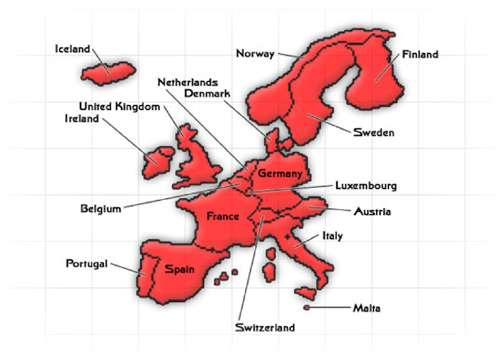Overview
Christianity seemed defeated until the latter decades of the tenth century. Animistic Vikings invaded Western Europe with little resistance, burning churches and monasteries, along with precious hand-written copies of the scriptures. The Magyar Empire pressed in from the east. Muslim armies moved north with their zeal for Allah. During the sixteenth century the Reformation revitalized the Church to become a force for world evangelization. In the last 250 years the gospel has advanced worldwide; however, it is declining in Europe today. European political ideologies such as humanism, secularism, socialism, Marxism, fascism, Nazism and amoral capitalism have contributed to such evils as global wars, colonialism and oppression.
 |
The twenty-nine countries of Western Europe are going through a period of unprecedented peace but, with political and economic integration, there is also ethnic fragmentation. Many of Europe’s great cities today hold in their straining arms a multitude of cultures and languages, drawn by education and opportunities or fleeing from war, famine, economic deprivation and sometimes horrifying situations. The situation is both rife with problems and rich with opportunities. Western European churches are usually empty edifices filled with more dust than worshipers. Nearly 234 least-reached people groups live here. From tiny Gibralter with seventy-four percent of its population least-reached, to France, Western Europe’s greatest challenge in terms of the gospel with a population of over seven million least-reached people in forty-one different people groups, now is the time to bring the gospel to those searching for answers in Western Europe.
Prayer Points
- Finding the Father. These people are far from the Lord. Pray that they will turn their hearts to their creator who can give them eternal life and will find the Father who seeks them continually.
- Firmness of faith. For the few Fulani believers, may they continue to grow in their faith in the Lord. Pray for those translating the scriptures into languages needed for these 234 least-reached people groups.
- Fearless witnesses. For others to come to the Fulani and these 234 people groups of Western Europe and give them a true testimony of the Lord.
- Fruit that remains. That those who have heard the word and are now far away will come back to the Lord and come to know him fully. For wisdom and clarity for those who are sharing the gospel among the Fulani and others.
- Fullness of life. For good health for the Fulani as they often die at an early age due to malnourishment and sickness in their homeland; pray also for those who are seeking to minister to their physical needs and for all 234 ethnic groups in Western Europe to find the fullness of life Jesus offers them.

Links
- Resources for prayer and to mobilize prayer and outreach.
- Discover Western Europe’s 234 least-reached peoples.
- Pray for the peoples of the Western Europe region.
- Obtain daily prayer guides for peoples of this region.
Background
|
|
Which Way Will They Go?
(Prepared by Keith Carey for the Global Prayer Digest)
Could you imagine not having any idea where to start regarding what you will eat in the morning or what you will wear to work? You probably would not be able to get out the door! For that reason, you must rely on a certain number of assumptions. We make assumptions every day, and they keep our lives from becoming impossibly confusing.
Likewise, cultures have assumptions. In the United States, which we will cover in two months, the assumption regarding immigrant groups is that they will integrate with the larger American culture and become part of the same culture in two or three generations.
But the peoples of Western Europe have had a different set of assumptions. In places like Germany, the Netherlands, England and France, the assumption in general terms is that peoples from the Developing World will come as guest workers, make their money, then return to wherever home may be. They, and perhaps the guest workers themselves, did not anticipate that these people would eventually bring their extended families to come live with them and stay for good.
Therefore, as a general rule these groups, many of which are Muslim or Hindu, are encouraged to live in separate ethnic neighborhoods where they have their own languages, schools, places of worship, markets, etc. They are seen as foreigners, even after the third generation. They are looked down upon, and not given opportunities, even when they speak the local language. The result has been resentment which continues to smolder, and no one has any acceptable answers.
Western Europe's answer to the problem of religious intolerance is to secularize society.
To some, the answer is to send the “foreigners” home. The problem is that some are now citizens, so they cannot be deported. Additionally, the Europeans often depend on their labor.
Others say that it is best to adopt a policy of “multiculturalism.” There should be many cultures and languages, and all should be equal. The problem is that they cannot all be equal. There must be a dominant trade language and a set of agreed-upon moral values. In Europe, that means democracy, equality and tolerance. So it comes as a shock to Europeans when Muslim communities force their young daughters to marry men from the old country. Sometimes when the daughter does not comply, the family will murder her and call it “honor killing,” with the explanation that allowing her to live would have brought dishonor to her family. Will “multiculturalism” allow for this kind of behavior? Few will argue that it will. ![]()
Others want the immigrants to assimilate like they do in America. The problem is that both the guest and the host communities must allow assimilation. Often the “guests” do not want to become part of the secular, hedonistic cultures that they find in Europe. And with all of their talk about equality and tolerance, many Europeans, especially the French, do not accept people from other cultures. Studies have shown that with identical resumes, job applicants with Muslim names are far less likely to be called for a job interview than those with French names. The French government has gone out of its way to secularize public life. For example, Muslim girls are not allowed to wear the traditional headscarf to school.
Secular Western Europe
Europe has endured hundreds of years of wars, many of which have pitted one religious group against another. Their answer to the problem of religious intolerance, which brought on these wars, is to secularize society. Although some countries, notably England, have religious instruction in public schools, most Europeans have opted to secularize all public institutions. Tolerance for liberal ideas—ideas like same-sex marriage and co-habitating couples—are almost unquestioned. According to a March 2006 New York Times article, in the Netherlands, potential immigrants from Muslim countries must first see a video featuring a topless woman sunbathing and two gay men kissing to discourage them from coming if they cannot tolerate such behavior. Thus, immigrants, many of whom are from unreached people groups, are coming to nations where the moral values are defined more by secularism than by biblical Christianity.
According to a 17 April 2006 article in the Christian Science Monitor, “Across Europe, the number of children born to unmarried couples has risen six-fold over the past thirty-five years to nearly one in three of all babies, altering the face of the European family beyond recognition—and beyond recall—say demographers and social analysts” The article quoted Dr. Peter Brierley of England’s Office for National Statistics (ONS) as saying, “People these days don’t expect their marriages to last, so they think, ‘Why get married in the first place if weddings are expensive and divorce complicated?’” The purpose of the ONS is to provide information to help British church leaders make “informed” policy decisions. The churches are expected by local customs to keep to themselves and not try to impose their moral beliefs on others.
Outreach
There is no doubt that the Church is weak in secular Western Europe. According to Tom Hundley, who published an article in the 27 June 2006 edition of the Chicago Tribune, “In France and in almost every other European country, Christianity appears to be in a free fall. Although up to eight-eight percent of the French identify themselves as Roman Catholic, only about five percent go to church on most Sundays; sixty percent say they ‘never’ or ‘practically never’ go.” The rest of Western Europe is in a similar state. Last summer, the final text of the European Union’s new constitution made no mention of God.
This is not to say that there are not vibrant Christians in Western Europe. Wherever you go around the world, you will find some of the finest missionaries are from Germany, the Netherlands or England. But there are far too few of them to give the unreached people groups in that part of the world a fair chance to hear the gospel. Ironically, Europe is a place where they can legally hear the gospel without government or social interference. The unreached can be reached in Western Europe. They cannot easily be reached in Algeria, Pakistan or Turkey. Although the workers are few, there are some excellent ministries working among Europe’s unreached immigrants. Let us highlight some of these for prayer.
- Operation Mobilization (0M). OM has been engaged in training and evangelism among European Muslims each summer for the past twenty years through a program called “Turning Point.” This effort includes door-to-door evangelism, street surveys, video evenings, a coffeehouse ministry, outdoor book tables and programs for mothers and children.
- Christar. Perhaps the most strategic ministry in Europe today is done by Christar. Mission history teaches us that people who live among those they are trying to reach and stay for whatever time it takes do the most effective ministry. Christar workers do just this. Providing child care, language lessons or hospitality can go a long way toward making friends and winning people with the love of Jesus.
- South Asian Concern. In many cases, the best ambassador for Christ is a believer from a similar cultural background. The Christian organization South Asian Concern takes on this role not only in Europe, but it many other parts of the world. Most south Asian people groups in Europe are still unreached, and they are far more likely to interact with south Asians outside their communities when they live in a foreign land. So when south Asian Christians put on an event with speakers, discussions and good food, south Asian members of all religious and ethnic communities are willing to attend.
- Peers. Local indigenous European groups are also being reached by their peers, according to an April 2006 article in Charisma magazine. Northern Scandinavian Sami Christians are showing members of their communities how they can worship Christ within their own cultures. Thus the gospel—and Jesus himself—become one of their own, instead of appearing foreign.
Let us continue to pray for those who are reaching out to the peoples of Western Europe who have never trusted in Jesus Christ. Pray that they will be filled with the power and fruit of the Holy Spirit. Pray that they will be obedient to the prompting of the Holy Spirit in all they say and do. Pray that the people to whom they minister will be receptive to the person of Jesus Christ.

